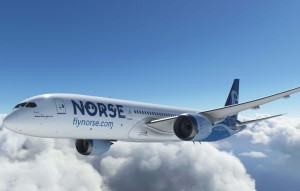Norse Atlantic Airways, selling unbundled passenger flights between Europe and US at a steep discount, is marketing belly cargo space on its fleet of young Boeing 787-9 Dreamliners at 10% to 20% below current transatlantic air freight rates.
The Arendal, Norway-based, two-year-old carrier, with four daily flights to New York’s John F. Kennedy International Airport and regular and seasonal service from European capitals to six major US cities, is aggressively courting forwarders, 3-PLs and specialized shippers, touting its reliable schedules and bargain pricing, Charles Duncan, president, told AJOT’s Air Freight News (AFN) in an exclusive interview.
For example, five flights weekly between Boston/Logan and London Gatwick doesn’t start until Sept. 2 while four time a week service between Fort Lauderdale and London and twice weekly flights between the South Florida city and Oslo ends Sept. 17.
Yet Norse is shifting its combo cargo and passenger capacity to the much bigger Miami International Airport the following day—Sept 18—to serve London, Oslo and is adding Paris and Berlin on Dec. 12 and 14 respectively. The move to Miami gives European exporters direct connections into South America.
The airline provides year-round service to and from the West Coast’s Los Angeles International and London daily and twice weekly between LAX and Oslo and three flights a week from San Francisco International for technology, perishable, and other shippers.
Its daily flights to New York link JFK to Rome, London, Paris, and Oslo.

The Big Picture
Unlike some low-cost airlines that fly limited routes, Duncan has a much wider vision for Norse, probably because he served several decades in senior executive positions with Continental Airlines in its heyday and later with United Airlines which bought Continental. He also headed Air Micronesia, a low-profile but highly respected subsidiary of Continental that flew passengers and freight across the Pacific.
He later served as executive vice president-cargo strategy and mergers and acquisition of WestJet, the large regional Canadian airline. With his global airline experience, Duncan was recruited by Norse Atlantic’s founder, CEO and major shareowner, Bjorn Tore Larsen, to pilot the airline day-to-day.
“Air cargo is a fundamentally important part of our business model, and the 787-9 is a really good cargo hauler,” he says, adding that freight was never an afterthought. “It’s been an intentional part of our strategy from the beginning. With luggage and nine PMC pallet positions, a heavy cargo flight for us is 30 tons. We move 30 tons of fish to JFK out of Oslo regularly.”
Rather than build a major cargo sales, operational and handling team inside, Norse Atlantic hired Kales Airline Services, an international general sales and service agent (GSSA) headquartered in Amsterdam in the center of Europe. “They’re doing a fantastic job for us,” Duncan says, however, there is an imbalance on exports vs imports. “Right now, it’s an 80 (exports from Europe) 20 (imports from US cities) split and a lot of the tonnage is dense perishables such as tomatoes from Paris and bottled red wine from Rome plus auto parts out of Germany and a lot of e-commerce.”
Norse, through Kales, is working with consolidators and express carriers and moving cargo for “anyone” who wants excess capacity at a below market price to the U.S. Normally candid, Duncan gets tightlipped when questioned whether the airline is blocking space for any giant freight forwarders at a below market rate. “We are working with several, but I cannot disclose their names,” he tells Air Freight News.”
Asked if Norse Atlantic is targeting the brisk transatlantic pharmaceutical trade, he says “We are working on that area. A lot of transatlantic pharma is going to and from Ireland and we don’t have a presence in Ireland. I do expect when we get into Dublin in the future, pharma will be an important part of our cargo business but now we’re not the first choice for pharmaceutical customers.”
Reliable Service
Meantime, Duncan says that Norse is a “value” product on the passenger side by selling its services “unbundled” or a la carte and offering a reliable service. “Since May 1, we have not cancelled a single flight. We have had a perfect completion record and that is something shippers expect—no, demand. So, we are hanging our hat on that level of operational performance and we’re knocking on forwarder, consolidators and express doors with Kales, our GSA and introducing ourselves and telling our story.
“And we’re coming in with an aggressive price. With our pricing and our reliability and service, we’re going to be in the market to stay. Our goal: to win customers over one at a time.”
As for Kales’ approach to selling Norse belly capacity, Air Freight News reached out to the general sales and service agents’ Amsterdam headquarters twice but both calls were declined.
According to Duncan, though, when shippers see that “we’re actually here and operating on time, they send us business. But not immediately. They watch us for a week or two to make sure we’re for real. It’s about reliability. We have 15 Dreamliners but we are only operating nine and holding one back as a spare. Five are leased to Air Europa.”
Ironically, observes Duncan, “it’s a shame that we have reached this level of maturity just as demand in the air cargo market is softening. We talk to customers, and they tell us it reminds them of the great recession of 2008 and 2009. Yields are down.” But because of this softness, he adds, “customers are looking around for a good deal and we’re here to get that business.”
Norse Atlantic Airways is cushioned by the air cargo crunch, though, because while air freight is “entering a downturn,” he says, “the passenger market is still just red hot.”
Expanding Network
The airline is switching its Florida airports from Fort Lauderdale to Miami International “largely because of the cargo opportunities,” reports Duncan. “Cargo demand is just so much stronger in Miami, gateway to South America.” However, he doesn’t plan to add new routes from Europe or from North America to the Southern hemisphere.
At the moment, Norse has exclusive air freight “programs” with several major air freight forwarders, but he chooses not to identify them. “They are a couple of big household names and we’re giving them space allotments and they are giving us volume,” says Duncan. “We have a platform for small shippers too. On the cargo side, we’re trying everything and seeing what works.”
Norse also has some cargo interline partners including Emirates and Sky Cargo at Gatwick Airport and, just recently, Air Mauritius. He’s looking for more partnerships.


